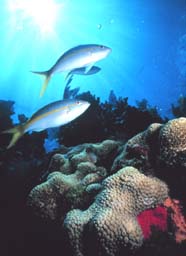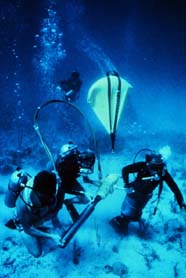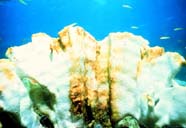New Scenarios
Causes of Reef Decline
References
In a Sept. 6, 2001, article, coral scientist Rupert Ormond of Glasgow University asserts that the future is hopeless for coral reefs (Cropley, 2001). He remarks that coral reefs—the victims of global climate change—would be dead in 50 years, and nothing can be done to save them. Even if humans were to halt the production of greenhouse gases immediately, Ormond claims that coral reefs still would perish because a 50-year time lag exists between limiting carbon dioxide levels and any effect it might have on controlling ocean temperatures.
Participants discussed the implications of this dire prediction. Some discussed the possibility that coral reefs could adapt to changing conditions or expand their range into cooler waters as water temperatures rose. Other participants discussed and debated the likely causes of reef decline.
|

Is this healthy Florida Keys coral reef destined for extinction? |
|
|
New Scenarios
Some participants raised the possibility that as sea temperatures rise, corals may adapt by relocating to cooler waters that have warmed. However, the consensus on this possibility generally was pessimistic. One participant noted that three geographic features work against the hypothesis. First, shallow water benthic habitats suitable to coral reefs are less common in higher latitudes. Second, light is limited in higher latitudes, a condition that will not change because it is dependent on the sun angle and day length variations. Third, increased atmospheric carbon dioxide, when dissolved in seawater, renders the water more acidic and inhibits reef calcification. Another participant added that in many parts of the world, the presence of land masses and other formations would prevent the corals from shifting geographically, especially in the Indian Ocean, the Red Sea and the Arabian Sea.
 |
|
Scientists prepare to drill into a coral reef to study climate over the past 20,000 years. Paleoclimatology may be able to tell us how corals survived (or failed to survive) past climatic disruptions. |
|
|
Still, many conceded that reef colonization on new shelves is possible, but it may not occur on a time scale detectable by humans. Rather, if one examines the fossil record, as several participants suggested, coral reef acclimation and recovery may occur over the course of thousands or more years, i.e., on geologic time scales. In addition, even if corals could acclimate to rapidly changing conditions within 50 years, humans may not be able to detect it using currently available data or experimental records, according to one participant. Thus, coral reefs “as we know them” are perhaps on their way out, and possibly will be replaced by a different kind of dominant coral reef community able to adapt to the new conditions, according to several participants.
A few participants also discussed the feasibility of the adaptive bleaching hypothesis (ABH), which theorizes that bleaching may be adaptive as well as pathological, “providing an opportunity for recombining hosts and algae to form symbioses better suited to altered circumstances” (
Buddemeier and Fautin, 1993). One participant recounted the assumptions of the ABH and reasoned that the vital ones are false, thus rendering the hypothesis invalid. A defender noted that the ABH is not meant to be treated as a law and is not meant to apply to every instance of bleaching. Rather, it is meant to be tested and refined as new information becomes available.
Top
Causes of Reef Decline
Participants also discussed potential causes of reef decline. One participant noted three general factors affecting reef survival: pollution, level of conservation/protection and population pressure. This participant suggested that population pressure was the “ultimate source of our problems.” Others discussed the interplay between global warming and human-induced pollution.
Another participant insisted that land-based sources of pollution most often are the culprits for coral die-offs—more so than global warming effects. The participant believed that land-based pollution is the dominant reef issue. However, few long-term studies exist that can prove its effect, and society likely will not take action until public health costs sink in, according to the participant. In the meantime, he suggested that scientists concentrate their efforts on remediating controllable factors, such as sewage and sediment stress.
 |
|
Corals throughout the Caribbean, like this one in the Florida Keys, are bleaching (casting out their algae). Some scientists hypothesize that certain instances of bleaching may have adaptive advantages.
|
|
|
Another participant questioned the assertion that land-based pollution was the major reason for reef decline. He noted that land-based sources of pollution may not be as important as supposed because the most acute effects often are located near shores, thus sparing reefs farther out to sea. He also asserted that sediment stress reduction may be an unrealistic goal because development activity shows no signs of slowing down. Thus, scientists should concentrate on understanding and mitigating land-based pollution effects to reduce adverse impacts, he stated. Scientists also should devote major efforts now to preserving healthy reefs, especially if those near the shore are being “timed out” geologically, according to the participant.
Finally, several participants noted that reef decline is not the result of one particular stress. The fossil record and research indicate that reefs can adapt to and survive individual stresses, provided favorable conditions return. However, current reef decline likely is the result of a number of interacting, chronic stresses. In the words of one participant, reefs are dying of “a thousand cuts.” In addition, managers rely on the scientific community to reach a general consensus on how to attribute relative threats and effects on coral reefs. trying to convince others that there is one dominant cause for reef decline is unhelpful to managers, another participant stated.
Top
References
Buddemeier, R., and D. Fautin. 1993. Coral Bleaching as an Adaptive Mechanism: A Testable Hypothesis.
Bioscience.43: 320-326.
Cropley, E. Sept. 6, 2001. World Coral Reefs to Die by 2050, Scientist Warns.
Reuters.

